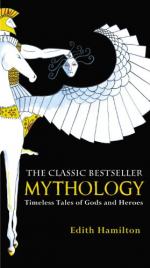|
|
Mythology Topic Tracking: Fate
Fate 1: In the story of Cronus ingesting of his own children, a long sequence of fathers killing their offspring to avoid fate begins. Cronus knew that one of his children was going to overthrow him, so he tried to eat them all. This does not work, because his wife deceived him and Zeus survived. Later, Zeus overthrows his father and becomes the king of the gods.
Fate 2: Psyche's father is saddened about his daughter's fate so he sends her away. When Psyche hears of this fate from her sisters, she is curious about her lover. Despite warnings about taking her sisters' advice, she listens to them and looks at his form. This hurts Cupid and separates the lovers.
Fate 3: Pelias has been fated to be killed by a relative. When he hears this, he suspects Jason because Jason wants to regain the throne. He sends Jason on a difficult quest and kills his father while he is gone, because he does not expect him to return. When he does return, Pelias dies, not at his hands of Jason, but at the hands of his own daughters, who were led to believe by Medea that they were doing their father good.
Fate 4: In these tales are two important tales about striving beyond one's means. Phaethon attempts to drive the chariot of the sun and dies because this position was meant only for the divine. Otus and Ephialtes try to prove themselves to be stronger than the Olympians and are eventually killed because such a threat unbalances the supremacy of heaven over earth.
Fate 5: Acrisius is not at first a wretched father, but he wishes to avoid his fate by preventing his daughter from bearing a child. When Zeus impregnates her, he casts her and the child into the sea. Nevertheless, many years later, a wild discus, that just happens to be thrown by his grandson, strikes him and kills him.
Fate 6: The Oracle at Delphi instructs Hercules how to atone for his great crime against his family. These twelve labors are his fated recompense for an unholy deed. When he completes them, he makes yet another mistake and must complete more service. His death, though accidental, brings him to his rightful position in the heavens.
Fate 7: Achilles and Hector both have fates that weigh heavily upon them. Achilles knows that Greek victory is dependent upon his death in battle; he must face this every day. In a similar way, Hector, and his wife, know that Troy cannot fall until Hector falls. For both heroes, this is a struggle. Hector must be brave and save his own life, while defending the city. Achilles must be brave and not shy away from giving up his own life.
Fate 8: Fate is a controlling factor in the Aeneid. Aeneas is propelled across the Mediterranean because he is supposed to lay the foundations of Rome. Whenever he hesitates, bad things happen. He has no choice but to follow the way of fate and do as his duty requires.
Fate 9: Orestes is thrown into a paradox by the death of his father. He must avenge his death, but this means killing his mother. He cannot reconcile this on his own and must consult the oracle at Delphi, who orders him to kill his mother and her lover. He does this, but not with impunity. He suffers for many years.
Fate 10: Oedipus is the most well known tale of attempts to avoid fate. Both Oedipus and his father, Laius, try to avoid their fate and unknowingly walk right into it. Oedipus kills his father and marries his mother. Not knowing he was an orphaned child, Oedipus was brought up to become a popular King and a good husband. The realization of his tragic fate is gruesome and horrifying.
Fate 11: The Norse fate is truly a dire one. Ragnarok is on its way no matter what, and everyone must prepare for it. The life of the gods and of men focuses around delaying the inevitable. This sweeping and universal fate is not found in Mediterranean mythology.




